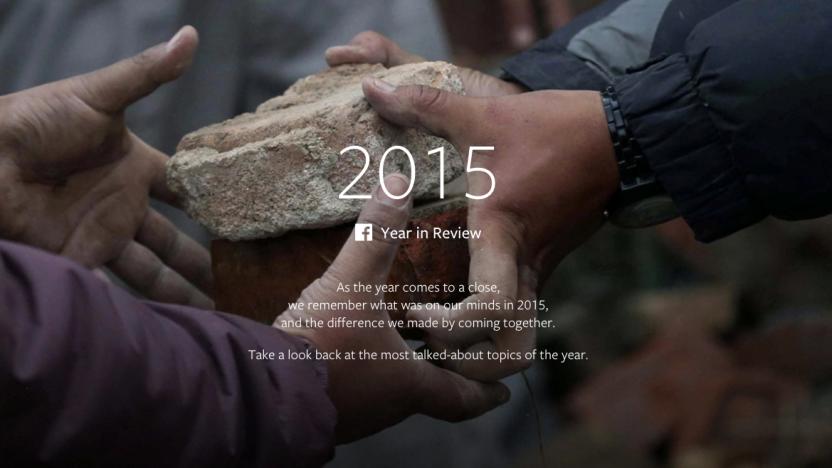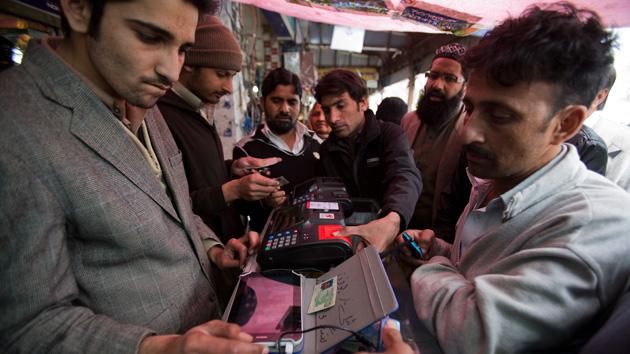terrorism
Latest

French prime minister says public WiFi will not be banned
A few days ago, French newspaper Le Monde reported on the existence of a document suggesting the country's police are seeking a bill that would severely limit internet freedom, access and privacy. Among requests noted on the "wishlist" were a ban on access to Tor, a way to shut off public WiFi access during emergencies and for providers of encrypted communications to hand over the keys to authorities. Now, prime minister Manuel Valls says a ban on WiFi is not a part of any new security measures.

Facebook's 2015 review video puts the year in perspective
One of the internet's greatest achievements is its ability to connect disparate global communities in discussion and, at times, compassion -- and a lot of that conversation takes place on Facebook. The company's Year in Review, a video and list released today, outlines the top 10 stories of 2015, including the US presidential election, Paris terrorist attacks, Syrian civil war and refugee crisis, Nepal earthquakes, Baltimore protests, and marriage equality. It's a snapshot of a year with extreme peaks and valleys, ultimate joy and devastation.

New York's anti-terror reporting app could easily cause problems
New York state is understandably more anxious than ever about terrorist threats, and it's hoping that some mobile technology will bolster its defenses. Governor Cuomo has launched a campaign that encourages New Yorkers to use See Something, Send Something, a smartphone app that helps you report suspicious activity to officials. While the software is already in use in five states, this promises to be its biggest test yet. It's coming to one of the most populous parts of the country, and one where terrorist attacks have been all too real.

Belgian Twitter users post cat pics to help police in weekend raids
Belgium's capital, Brussels, entered lockdown this weekend as authorities swept the city for suspected terrorists, including at least one high-profile fugitive wanted in connection with the Paris attacks. On Twitter, authorities prompted residents to refrain from posting pictures or information about ongoing police movement -- and Belgian residents obliged, with a twist. They flooded the hashtag #BrusselsLockdown with pictures of cats, making information about raids harder to find and showcasing the country's solidarity against terrorism. On Monday, as the city remained under its highest-level terror alert, Belgian federal police thanked residents on Twitter with a picture of cat food and the message, "For the cats who helped us last night... Help yourself!"[Image credit: Flickr/julochka]

Here's how ISIS tries to keep its online activity a secret (update: debunked)
It's no longer surprising that ISIS uses Telegram's secure messaging to conduct its terror campaigns, but what other tools does it use to keep its online actions under wraps? Thanks to researchers at the West Point military academy, we now have a good idea. They've obtained an ISIS operational security guide that shows the outfit's recommended internet services and software, as well as the policies they're supposed to follow. The extremists are advised to use Tor's anonymity network for browsing, Tails as their operating system and messaging services like Telegram, FireChat or iMessage. They're asked to rely on secure phones like the BlackPhone if they can. They're supposed to avoid both anything that gives away their location (for obvious reasons) as well as Dropbox, whose company-managed encryption theoretically lets governments demand access to cloud storage.

Telegram founder knew ISIS was using his service before Paris attacks (updated)
Secure messaging service Telegram announced on Wednesday it had shut down 78 ISIS-related channels since the deadly attacks on Paris and Beirut, alongside a statement saying the company was "disturbed to learn that Telegram's public channels were being used by ISIS to spread their propaganda." This made the situation sound like new information to Telegram -- but that's not the case. At TechCrunch Disrupt in September, Telegram founder Pavel Durov told interviewer Mike Butcher that he knew ISIS used his app (as spotted by The Washington Post). "I don't think we are actually taking part in these activities," Durov said. "I don't think we should be guilty or feel guilty about it." The relevant conversation went down as follows:

Let's have an argument about encryption
Government officials have been vexed for quite some time now that they can't surveil communications that use end-to-end encryption. Never mind that to crack encrypted platforms open for one spy would mean to open them up for all spies. Just being able to roll WhatsApp, Telegram and iMessage into the Pentagon's bulk surveillance programs is good enough for them, thanks. Worrying about what that might mean to the intelligence gathering capabilities of their adversaries is apparently "not in their department."After the devastating attacks in Paris last Friday, U.S. officials wasted no time in using fear to insist that messaging apps using end-to-end encryption be "backdoored" for surveillance access, and rolled into the Pentagon's bulk surveillance programs.The internet, rather than treating the officials like children who want to smash the family piggy bank to collect copper pennies, has decided to argue with them.

Telegram blocked 78 ISIS messaging channels this week
As details emerged after ISIS' coordinated, deadly attacks on Paris and Beirut last week, one name stood out in conversations about communications channels: Telegram. ISIS operatives use Telegram and other encrypted messaging services to communicate -- a fact that was apparently news to Telegram. In response, this week the company blocked 78 ISIS-related channels in 12 languages. "We were disturbed to learn that Telegram's public channels were being used by ISIS to spread their propaganda," the company writes. Telegram found and blocked the channels based on user-submitted reports.

ISIS' online presence reportedly includes a 24-hour 'help desk'
The terrorist group known as ISIS has ramped up its online outreach efforts in a big way over the past year, including establishing a 24-hour help desk that teaches members how to use encryption and other secure communications tactics, NBC News reports. News of the help desk comes from Dr. Aaron Brantly, a cyber fellow at the Combating Terrorism Center with the US Military Academy at West Point. According to Brantly, ISIS has "developed a series of different platforms in which they can train one another on digital security to avoid intelligence and law enforcement agencies for the explicit purpose of recruitment, propaganda and operational planning."

Anonymous goes to war with ISIS over Paris attacks
In the wake of ISIS' coordinated attacks on Paris Friday night that left 129 civilians dead and scores more injured, the loosely-affiliated hacker collective known as Anonymous announced Sunday the launch of a massive cyber-campaign, dubbed #OPParis, designed to scrub the terrorist organization's influence from the internet while French airstrikes wipe ISIS strongholds off the map. "We can not fight them with guns and rifles," an Anonymous spokesperson told the BBC, "stopping their propaganda is an effective way to weaken their manpower and their presence in the Internet."

Airbnb helps Paris attack victims' families find free places to stay
Facebook isn't the only internet giant offering a helping hand in the wake of the Paris terrorist attacks. Airbnb has launched a portal that helps anyone affected by the attacks find (or offer) a free place to stay. If you're determined to meet with a family member or got stuck in the city during border closures, you won't have to pay a thing -- Airbnb is waiving its service fees at the same time. You have to check in no later than November 17th, but that's about the only condition involved.

Facebook expands scope of Safety Checks following Paris attacks
Facebook originally built its Safety Check feature to help you reassure friends and family in the wake of natural disasters. However, the recent terrorist attacks in Paris, Beirut and beyond have prompted a change of heart. Mark Zuckerberg has announced that Facebook will invoke Safety Check for "human disasters" from Paris onward. Simply put, the social network wants to make the tool available "whenever and wherever" it can help -- the company is aware that its policies have been inconsistent (responding to some tragedies but not others, for example) and need improvement. There's no certainty that Facebook has completely addressed the complaints with Safety Check, but here's hoping that we don't have to find out for a long, long time to come. [Image credit: AP Photo/Peter Dejong]

US prosecutes man who hacked identities to help ISIS
Extremism and terrorism are complex things in the internet era, and US federal prosecutors are learning this first hand. The Justice Department recently charged Kosovo citizen Ardit Ferizi with leading a hacking team that swiped the personal data of US military staffers in order to help Islamic State in Iraq and Syria (ISIS) supporters kill as many as 1,000 Americans. That campaign hasn't panned out, as you might have guessed, but it makes the consequences of a typical data breach look timid by comparison.

Virginia teen gets 11 years for ISIS support on Twitter
17-year-old Ali Shukri Amin from Virginia will spend the next 11 years and 4 months in a federal penitentiary for his role in running the powerful pro-ISIS Twitter account, @Amreekiwitness. This account collected and disseminated ISIS propaganda to more than 4,000 followers and shared instructions for using Bitcoin to secretly fund the terrorist organization. Amin also admitted to helping one of the account's followers to travel to Syria and join the group. That follower has since been arrested and is facing federal prosecution as well on a conspiracy to provide material support to terrorism charge.

Senator wants promises that net neutrality doesn't help terrorists
Telecoms and other net neutrality opponents usually try to paint the regulation as anti-free market, but they've lately raised the specter of terrorism. Supposedly, it might prevent internet providers from blocking extremist sites. It's a big enough concern, in fact, that Senator Dianne Feinstein wants reassurances that this isn't actually a problem. The California politician has written to the FCC asking it to "clarify" that net neutrality rules still let providers silence content that encourages illegal terrorist activity, such as the bomb-making instructions in al Qaeda's Inspire magazine. Feinstein doesn't necessarily believe the telcos' rhetoric, according to the letter -- she just wants to eliminate the ISPs' "confusion."

FBI: Retweeting terrorist organizations could get you arrested
The Federal Bureau of Investigation's least likely informant isn't a shadowy figure in a parking garage or an anonymous phone call -- it's a fast-paced social network with a short attention span: Twitter. According to FBI Director James Comey, the social network has proved to be an invaluable source of evidence against supporters of terrorism. An account that's constantly retweeting content from ISIS or ISIL could be a sign of criminal activity. That said, context still matters.

Canada greenlights an anti-terror law that hurts internet privacy
The US government might be curbing its surveillance activities, but just the opposite is happening north of the border. Canada's Senate has passed the heavily disputed Bill C-51 into law, granting spy agencies (like the Canadian Security Intelligence Service) greater powers to violate digital privacy in the name of fighting terrorism. The move lets government branches swap sensitive data like tax filings, and gives spies permission to load intrusive malware on suspects' devices. It also raises the possibility of searching devices at the border to find "terrorist propaganda," and should allow disruptive tactics like taking down websites. Moreover, there are worries that some online discussions wishing harm against Canada and its allies might be deemed illegal.

The French Parliament approves controversial surveillance bill
In an attempt to prevent terrorist attacks, the French Parliament has approved a new surveillance law that gives unprecedented access to intelligence agencies. According to the BBC, the new bill was drafted three days after the Charlie Hebdo killings. While the government insists that the intelligence-gathering systems will monitor suspicious activities, defenders of civil liberties believe it allows the state to carry out mass surveillance without distinction. Despite the debate, the decision to pass the bill was almost unanimous. Both the ruling Socialists and opposition voted in favor of it.

France's anti-drone drone can spot malicious pilots in under a minute
Paris has been hit with a spate of anonymously-piloted drones flying over key landmarks, government buildings and even a nuclear power station. It's not been clear if it's a group of amateurs with bad timing or something more coordinated, which has spooked the locals and law enforcement alike. Thankfully, French firm ECA has been quick to respond to the potential threat, building an anti-drone drone that can hunt down drones and identify their pilots.

Pakistan orders cellphone users to provide their fingerprints
Pakistan is determined to prevent terrorists from using untraceable cellphone accounts to coordinate attacks like that in Peshawar, even if it means eroding civil liberties in the process. The country has ordered cellphone users to have their SIM cards verified through fingerprints, theoretically discouraging extremists from relying on local carriers to communicate or trigger bombs. People have until April 13th (carriers have to comply by April 15th) to get their digits on the record if they want to keep their cell service intact.







